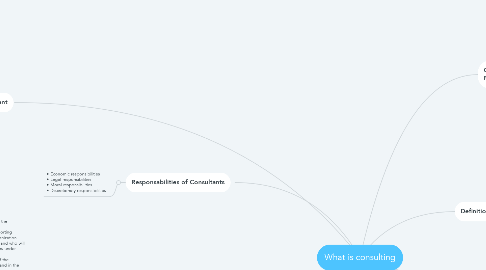
1. 8 Roles of a Consultant
1.1. 1. Objetive Observer 2.Process Counselor 3- Fact Finder 4. Identifier of alternatives and Linker to resources 5- Joint Problem Solver 6- Trainer/Educator 7-Information Specialist 8 Advocate
2. Responsabilities of Consultants
2.1. • Economic responsibilities • Legal responsibilities • Moral responsibilities • Discretionary responsibilities
3. Ground rules of Consulting
3.1. • Understand the ‘politics’ of the consulting exercise. • Be sensitive to who is supporting different positions in the organization. • Recognize who will benefit and who will lose from the different options under discussion. • Make sure the objectives of the consulting exercise are clear and in the open. • Make sure any information used can be legitimated and any analysis undertaken justified. • Build rapport with the client and be honest with the client about the strengths and weaknesses of his or her argument. • Introduce and explore options which reconcile different positions in a win–win way. • Provide the client manager with information and insights but allow him or her to make a particular case within the business – don’t be tempted to advocate it on his or her behalf. • If put in a position where credibility might be lost, remind the manager that a loss of impartiality and credibility will defeat the point of using independent consultants in the first place
4. 10 principles of Process Consultancy
4.1. 1. Always try to be helpful; 2. Always stay in touch with the current reality; 3. Access your ignorance; 4. Everything you do is an intervention; 5. It is the client who owns the problem and the solution; 6. Go with the flow; 7. Timing is crucial; 8. Be constructively opportunistic with confrontive interventions; 9. Everything is data, errors will always occur and are prime sources of learning; 10. When in doubt, share a problem.
5. Definition
5.1. A Consultant is a professional that offers expert advice in a particular area, in which he has a lot of knowledge and experience
6. Skills
6.1. Technical
6.1.1. • Project Management • Change Management • Process Management • Performance • Organization Design • Business Planning • Organization Development • Marketing • Finance • Operations Management
6.2. Process
6.2.1. • Analyze data • Problem identification • Decision Making • Negotiate / Conflict mgt. • Deal with politics • Deal with ambiguity • Deal with resistance • Deal with difficult people • Run meetings • Manage professional relation
6.3. Interpesonal
6.3.1. • Responsible • Assertive • Supportive • Empathic • Direct • Managerial • Resourceful • Communicate • Lead • Collaborate
7. Consulting and Management Roles
7.1. • Planning • Organizing • Staffing • Directing • Controlling • The Leader • The monitor • The Coach • The resource allocator • The negotiator • The disseminator • The spokesperson • The disturbance handler • The adviser • The Teambuilder • The energizer
8. Three Roles of a Consultant
8.1. Expert
8.1.1. • The manager elects to play an inactive role • Decisions on how to proceed are made by the consultant, on the basis of his or her expert judgment • Information needed for problem analysis is gathered by the consultant • Technical control rests with the consultant • Collaboration is not required • Two-way communication is limited • The consultant plans and implements the main events • The manager’s role is to judge and evaluate after the fact • The consultant’s goal is to solve the immediate problem
8.2. Pair-of-Hands Role
8.2.1. The consultant takes a passive role • Decisions on how to proceed are made by the manager • The manager selects methods for data collection and analysis • Control rests with the manager • Collaboration is not really necessary • Two-way communication is limited • The manager specifies change procedures for the consultant to implement • The manager’s role is to judge and evaluate from a close distance • The consultant’s goal is to make the system more effective by the application of specialized knowledge
8.3. Collaborative Role
8.3.1. The consultant and the manager work to become interdependent • Decision making is bilateral • Data collection and analysis are joint efforts • Control issues become matters for discussion and negotiation • Control issues become matters for discussion and negotiation • Communication is two-way • Implementation responsibilities are determined by discussion and agreement • The consultant’s goal is to solve problems so they stay solved
